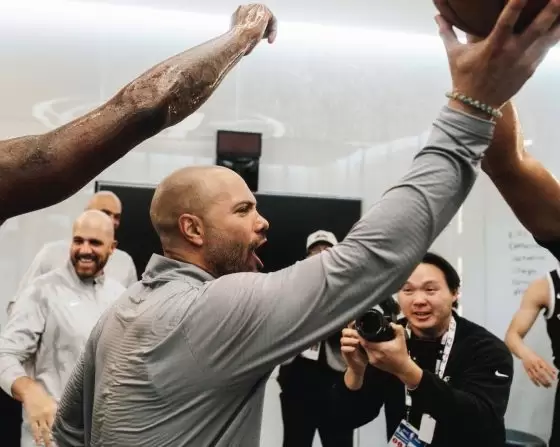Things change quickly in the NBA Playoffs. One game, a role player plays 20 minutes. The next game, he’s a coach’s decision DNP. Another game, a team comes out in drop coverage. Next game, they play at the level of the screen.
Whether it be rotations, schemes, shot distribution, or any other adjustment, teams are bound to make modifications to their initial plans – both within a series and between them.
That’s what makes good coaches, well, good. They come out with gameplans that they think will be effective against a team, but that doesn’t mean they are tied to those decisions. When things change during a series, a good coach will also change with them.
Joe Mazzulla and the Celtics’ version of these changes will likely involve Grant Williams. But, in this series, we might have to wait until garbage time to see Batman.
Why No Grant Against Atlanta?
The most important skill that Grant Williams brings to the table is his defense, but not all defenders are created the same. His strengths defensively most certainly do not reside on the perimeter against quick, small, and shifty guards and unfortunately for Grant’s minutes this series, that’s exactly what the Hawks have.
Trae Young and Dejounte Murray do most of the ball handling and creating for Atlanta, and they both thrive off of playing against slower–footed defenders who can’t keep up with their ability to get into the paint. Atlanta’s backcourt duo runs the most pick and rolls in the NBA; high screen and roll is the focal point of their offense and the way in which they get their guards going towards the hoop.
If Boston is in drop coverage – which was the primary scheme in Game 1 – the perimeter defender is tasked with fighting around the screen and attaching to the hip, which is tough for a brick house like Grant. You also can’t put Williams on one of Atlanta’s bigs, because he doesn’t bring the sort of vertical rim protection that Clint Capela and Onyeka Okongwu require on the glass and in the dunker spot.
As a result, Sam Hauser has overtaken Grant in the rotation. But just for now.
Photo by Erin Clark/The Boston Globe via Getty Images
Never Too Early To Look Forward
I can guarantee you one thing: when we play the Sixers in the next round, Grant Williams will be a cornerstone of the bench unit.
Sure, Grant’s defensive repertoire is not sticking with small guards; his strength is holding his ground against big, strong, physical offensive players (players like Joel Embiid, and even Tobias Harris, who both happen to play for Philly).
In a dominant win over the Sixers earlier this season, Grant showed flashes of defensive stability against the likely league MVP. He’s able to take the first bump (usually elbow) from Embiid while still having enough core strength to be ready for the next fake. He’s quite frankly a really interesting defensive wrinkle that the Celtics will almost definitely throw at Philly.
:no_upscale()/cdn.vox-cdn.com/uploads/chorus_asset/file/24589771/1246954392.jpg)
Photo by Erin Clark/The Boston Globe via Getty Images
Then, in a potential conference finals matchup against the Bucks, Grant would/should play a sizable role as well. The same reason Grant is effective against Embiid is why he’s maybe the best Giannis–stopper the Celtics have. The strength. The size. But, mainly, both of those tools combined with his ability to slide his feet and wall up is what makes Grant special against stars like Embiid and Giannis.
One More Thing
Grant getting phased out of the rotation can only mean his value on the NBA market should decrease. What was once looking like an infeasible salary to pay Grant in restricted free agency this summer could become more affordable should he continue to ride the bench this series.
Are the Celtics not playing him on purpose for this very reason? I’m not saying that. But, a cheaper future contract could certainly be an added benefit of lessening Grant’s playoff role. Just a thought.






